
This is the PowerPoint and lesson plan associated with the lesson 8 Tribes, 1 State.
- Subject:
- Arts Education
- Social Studies
- Visual Arts
- Material Type:
- Presentation
- Provider:
- Carolina K12
- Author:
- Carolina K12
- Date Added:
- 05/12/2021

This is the PowerPoint and lesson plan associated with the lesson 8 Tribes, 1 State.

Containing more than 50 articles from the award-winning Tar Heel Junior Historian magazine and over 40 lesson plans, this multidisciplinary Educator Notebook will enrich your exploration of North Carolina and American history with diverse perspectives. This resource's link takes you to a very short form that gives you free downloadable access to the complete PDF book.

Birth of a Colony explores the history of North Carolina from the time of European exploration through the Tuscarora War. Presented in five acts, the video combines primary sources and expert commentary to bring this period of our history to life. The accompanying teacher guides provide lesson activity ideas, vocabulary, and additional reading resources to compliment each act's theme. The 5 act themes are: First on the Land, The Road to Zacatecas, The Roanoke Voyages, A New Voyage to North Carolina, and , The Tuscarora War.

Birth of a Colony explores the history of North Carolina from the time of European exploration through the Tuscarora War. Presented in five acts, the video combines primary sources and expert commentary to bring this period of our history to life. The opening segment describes the forces that motivated European exploration and colonization of the New World. Explorers and colonists encountered native peoples with agricultural lifestyles, strong communities, and respect for the land. These Indian communities saw themselves as part of nature, and they lived in harmony with the natural world. Their spiritual practices, such as the Green Corn Ceremony, reflected this worldview. The Europeans came to the New World primarily in search of land and riches. With two such different cultural viewpoints, clashes were inevitable. This teacher's guide includes a strictly social studies lesson and a complementary ELA lesson (writing assignment).

Birth of a Colony explores the history of North Carolina from the time of European exploration through the Tuscarora War. Presented in five acts, the video combines primary sources and expert commentary to bring this period of our history to life. Act II of Birth of a Colony focuses on the Spanish exploration and exploitation of the New World and the attempt to find a new route to Zacatecas. Vast wealth from silver enabled Spain to finance more exploration and expand its empire. In an effort to defend Spanish trade and protect Spain?s investment in the mines, King Philip II launched an attempt to establish a colony in North America. This teacher's guide contains 2 SS lessons plans: Finding a Lost Spanish Fort; Mapping Juan Pardo. Additional suggested resources are also included. The Birth of a Colony video can be accessed at the following link: http://video.unctv.org/video/2149619983/ The referenced article can be accessed at the following link: http://www.ncmuseumofhistory.org/collateral/articles/F07.lost.spanish.fort.pdf

If students take away anything from Remarkable Journey, it is hopefully the incredible ways the Indian community has contributed to the progress, growth, diversity and richness of the state of North Carolina. In this activity (best conducted after students have been exposed to multiple clips or the entire film,) students will consider all that they have learned about India and its people then create movie poster for Remarkable Journey that they think best highlights these themes.
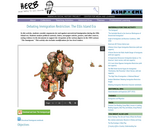
In this activity, students consider arguments for and against unrestricted immigration during the Ellis Island era. Students analyze political cartoons, letters, newspaper articles, posters, and other sources, noting evidence in the documents to support the viewpoints of the various figures in the 1903 cartoon "The Immigrant." This activity also includes modifications for low-level readers.

This lesson will look at how the First Quota Act worked to decide who could come to America, and decreased the number of immigrants passing through Ellis Island. The students will be interpreting and displaying the data, and looking for trends with possible explanations.
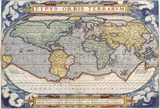
This resource is designed to assist students in understanding of the Eruopean explorers, who they were, what they did, and what impact they have on the modern world. Students will watch brief biographgical videos from Bio.com and History.com about each explorer to complete the questions on the graphic organizer.

In this lesson, students will familiarize themselves with some basic facts about India that highlight its diversity. Students will then view excerpts from (or the entirety of) Remarkable Journey and utilize the film’s information as a jumping off point to learn about various aspects of Indian culture (food, music, film, clothing, dance, and religion.) Yet, despite such diversity, Asian Indian immigrants to North Carolina, fellow strangers in a strange land, often rely on their shared roots to build new and unified communities. Students will discuss this concept then use their discoveries to create a mural that exemplifies the theme: "India: Unity in Diversity."

India is a diverse land of religions and spirituality. It is not only the birthplace of Hinduism, Buddhism, Jainism, and Sikhism, but numerous other faiths are practiced there, including Islam, Christianity, Judaism, Zoroastrianism, and others. Through viewing clips from Remarkable Journey and completing the following activities, students will explore the various religions with connections to India, as well as the way Asian Indians have integrated their diverse religions into communities across North Carolina. As a culminating activity, students will delve further into one particular religion mentioned during class by creating a scrapbook of that religion.
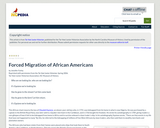
This resource provides information on the forced migration of African Americans in the mid to late 1700's.
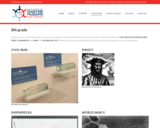
Students become aware of the importance of the maritime history and culture of the North Carolina Outer Banks through the study of WWII, Piracy, Shipwrecks, and the Civil War.
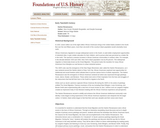
In this lesson, students will explore the social, economic, and technological changes of the early twentieth century by examining art, literature, and music from the 1920's and 1930's, emphasizing Jacob Lawrence, Langston Hughes, Duke Ellington, Louis Armstrong, and Bessie Smith and including the Harlem Renaissance. By the end of this lesson, students will be able to demonstrate knowledge of the social, economic, and technological changes of the early twentieth century by describing the social changes that took place including the Great Migration.
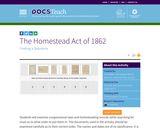
In this interactive online lesson, students will examine congressional laws and homesteading records while searching for clues as to what order to put them in.
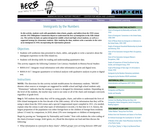
In this activity, students work with quantitative data (charts, graphs, and tables) from the 1910 census and the 1911 Dillingham Commission Report to understand the lives of immigrants in the Ellis Island era. The activity includes an option designed for middle school and high school students, as well as a suggested strategy for elementary students. After studying the data, students write a narrative in the voice of an immigrant in 1910, incorporating the information gleaned.

In this lesson, students will consider immigration in general as well as through the specific lens of the Asian Indian immigrant experience by viewing clips from Remarkable Journey. Students will explore their own immigrant ancestry as they consider the concept of America as a "Nation of Immigrants," as well as the varying reasons for immigration throughout history, the varied experiences of immigrants, their relationship to the American Dream, and the misconceptions that often frame immigration in our society. As a culminating artistic activity, students will create an updated Statue of Liberty - a new design that addresses immigration, America as a "Nation of Immigrants," the concept of the "American Dream," and the related concepts addressed throughout the lesson.
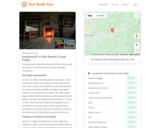
Discover the stories of the men, women, and children that were enslaved and lived at Vance Birthplace in the mountains of North Carolina from 1795-1865. This audio tour was completed in partnership with the North Carolina African American Heritage Commission.
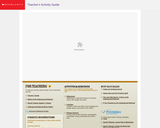
This resource supports English language development for English language learners. This online activity follows a young slave's escape from a Kentucky plantation. At each of the four "stops" on this journey, students can listen to audio support of the reading, read primary source quotes, listen to an audio slideshow of primary source images, and write about what they've learned. The teacher's guide provides background information, a Words to Know list, discussion questions, and extension activities.

In this group of lessons, students will learn facts to dispel common myths about immigrants. Students will also explore the reasons for immigration throughout history, as well as the historical through-line regarding the quest for the “American Dream.†Using the Introduction to “A Home on the Field†and an excerpt from Chapter 11, students will gain an understanding of how these issues are at play in North Carolina’s current immigration issues.